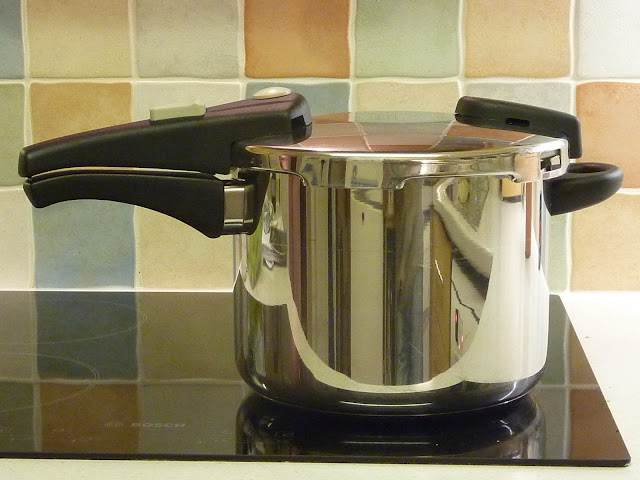 |
| A steel John Lewis pressure cooker, suitable for using on an induction hob |
Even when I was completely undomesticated, young, free and single I had a pressure cooker. It was quite small and got used several times a week, mostly for cooking vegetables. Some thought I was very brave - especially my parents who feared it would explode and turn by apartment into a disaster area with food splattered all over the kitchen cupboards, ceilings, walls and me.
Happily I can tell you none of that happened. Roll forward to married life and we have a family sized pressure cooker, as you can see. This one is a John Lewis pressure cooker - not bad but not perfect - more about that later.
As I see it, here are the advantages:
Food tastes better
Some foods that are pressure cooked seem to retain their flavour and taste much nicer. The most obvious one is carrots but pressure cooking enhances the flavour of many different foods. I have even had requests from my daughters for "pressure cooked carrots by Daddy" because they're so nice.
It seems the normal method of boiling vegetables in a normal saucepan washes the flavour out, making them taste bland and flavourless.
Energy
As foods cook in a fraction of the time, it follows the energy consumption will be much less. Simple as that.
Besides, we remember being in Kenya and staying in an upcountry village without running water or electricity. Our hosts used a pressure cooker over charcoal to cook for us. This was a strange sight - the scene must have been almost unchanged for several generations apart from, you guessed it, a pressure cooker there in the middle. It was useful for our hosts in preparing meals efficiently and in using less charcoal which was a fairly expensive resource for them.
Speed
We reckon root vegetables cook in half the time. Potatoes, carrots etc take about 10 minutes, depending on their size etc. Other foods such as dried beans, lentils etc will also have drastically reduced cooking times.
Don't fill your kitchen with steam!
Modern pressure cookers don't hiss and blast steam into the kitchen like they used to. When our John Lewis pressure cooker is at full pressure, the amount of escaping steam is insignificant. Of course, when it's time to release the pressure at the end of the cooking, simply turn on your extractor fan (I turn ours onto full blast) for a minute and the steam is whisked away and we don't end up with a steamy, jungle-like kitchen.
Nutrients
With reduced cooking time, it is likely that fewer nutrients will be destroyed through the cooking process but do remember cooking will reduce the goodness generally. The plus side is that it's worth using the small amount of water in the pressure cooker for gravy or other sources as it's inevitably had some of the juices from the fruit or vegetables drip down thus adding to what is already there. It's an opportunity to make the most of every drop!
Buying a pressure cooker
Here's a few hints:
- Buy a steel pressure cooker and you can use it on all heat sources. Aluminium does not work with Induction hobs.
- Can you buy spares easily? Might be worth buying some spares early on, especially rubber seals. Is it manufactured by a "known" name with a good reputation?
- Make sure it's big enough, remembering that shouldn't be more than 75% full
- Get a decent quality pressure cooker and it will last a lifetime of use. So if you're young and getting engaged, why not include one on your Wedding list? Does that sound quaint and old fashioned? Who cares!
Quality informative article, thanks for the read. I also write about pressure cooking, mainly cooker reviews but i also write tips and recipes @ http://www.pressurecookercentre.com/
ReplyDeleteGreat article.
ReplyDelete